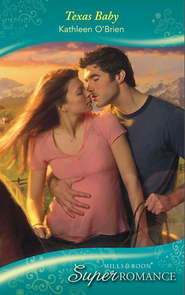По всем вопросам обращайтесь на: info@litportal.ru
(©) 2003-2025.
✖
Rescued by a Wedding: Texas Wedding / A Marriage Between Friends
Автор
Год написания книги
2019
Настройки чтения
Размер шрифта
Высота строк
Поля
“You should have heard the little weasel.” Zander grimaced. “Kid should be an actor. He spread honey on her like she was his own personal biscuit. Ninety-three percent of it pure baloney, if you ask me.”
“But I didn’t.” Susannah tightened her voice. “I didn’t ask either of you. It’s my decision.”
Zander growled under his breath, like a fussy old hound. “You do remember what he did at the Clayton place, don’t you? You remember he walked away from a sick horse, didn’t care whether the animal lived or died? You remember Trent had to fire him?”
“She remembers.” Trent’s smile was gone. In its place was cool speculation. “Is that part of the appeal, Susannah? Do you think it would be fun to tweak my nose a bit?”
It might be fun, she thought, to see if she could slap that insufferable arrogance off his face. But she gritted her teeth and braided her hands behind her back. Her famous self-control was the only thing that kept Zander from quitting. She’d heard him say it was beneath him to work for a woman, but Ms. Everly didn’t really act like one, so he didn’t mind too much.
She lifted her chin. “As I’ve pointed out before, Trent, not everything I do is about you.”
But he just grinned again, and her palms itched. How did he do this to her? Why couldn’t she learn to be immune to his snarky comments and his laughing eyes?
She had been vacillating about Eli, but suddenly her mind was made up.
She moved to the door, opened it, then turned to her foreman. “Hire him. Ask him if he has a brother, an uncle, a dog. Hire them all.”
“Dumb decision,” Zander muttered. “You’ll regret it.”
“Oh, I wouldn’t worry about that,” Trent said pleasantly. Susannah had let the door begin to fall shut, so she almost missed the rest of the comment.
But his words were loud enough to follow her, like a dart finding its bull’s eye.
“Our Susannah’s a clever woman, Zan. Trust me. If she regrets it, she can always find a way to wriggle out of it.”
CHAPTER THREE
AT THREE O’CLOCK that afternoon, Trent knocked at the baby blue door of a little white cottage over in Darlonsville.
“Trent!” Peggy Archer held out her hand. Her eyes were wide, and she seemed momentarily speechless. “I didn’t expect to see you today. Shouldn’t you be with…her?”
Trent sensed the trembling in her fingers and squeezed them reassuringly. “I’ve had a date with you every Saturday afternoon for five years now, Peggy. Marriage isn’t going to change that.”
She nodded slowly. “Especially that marriage.”
“Not any marriage. You told me your satellite dish is broken. I know you can’t live without your Sunday night football.”
He smiled, aware that Peggy never watched sports on TV, but hoping to distract her from the subject of Susannah. It was a sore one in this house.
Long ago, when they were kids, Peggy’s son Paul had been part of the inseparable quartet, the Fugitive Four. Trent, Chase and Susannah had all been Peggy’s surrogate children, eating her corn dogs and hot chili every summer afternoon at the Bull’s Eye ranch, the ten-thousand-acre Archer homestead.
But then, eleven years ago, a quarrel between Trent and Susannah had escalated into tragedy, and Peggy’s son, Paul, had ended up dead. It had been about ninety-nine percent Trent’s fault, and it had taken him years to find the courage to come back to Texas and face what he’d done.
Facing Peggy had been the toughest. But little by little, she had forgiven him and let him slip into the role of surrogate son once more. Oddly, as the years had gone on, she had ended up blaming Susannah the most.
When Trent had told her about the one-year marriage, the news had seemed to distress her out of all proportion. Trent had assumed it had been because of Paul, but he wondered now if Peggy had simply feared she’d lose Trent’s weekly visit.
Darn it. Foolishly, he’d taken for granted that she would understand. He’d never stop coming to see her, not as long as she needed him.
His debt to her was eternal. It would never be paid.
He tightened his grip on her hand. “Hey. Don’t I get invited in?”
“Of course, but—” She glanced over her shoulder as she backed away from the door. “I thought you weren’t coming, so—”
Just at that moment, her ex-husband, Harrison Archer, ambled in from the kitchen, muttering under his breath and studying the bracket that ordinarily held the satellite dish up on the roof.
Harrison was a balding, Texas-sized good old boy with a chest as round and barrel-shaped as any of his steers. At his heels trailed his son Sean, who at eight years old already looked shockingly like Paul. Both sons from Harrison’s second marriage did. It was the red hair, mostly. Harrison’s new wife, Nora, was half Peggy’s age, but otherwise could have been her clone—same fiery hair, petite body and smart hazel eyes.
Everyone knew what Harrison was doing when he married Nora, only two years after Paul’s death. He was doubling back to square one and starting over. Or trying to. But in spite of the healthy new sons and the pretty wife, there was still something dead in his eyes that made Trent uncomfortable whenever their gazes met.
“Trent. Thank God you’re here.” Harrison held up the bracket. “I can’t figure this blame thing out to save my life. And Sean has a game tonight. All right if I let you take over?”
“Sure.” Trent smiled at Harrison and then at Sean, who was a cute kid, gangly in his miniature polyester Red Sox uniform. “Hi, kiddo.”
“Sean is pitching today,” Harrison said in his deepest proud-father voice, his chest expanding subtly, stretching the buttons of his five-hundred-dollar denim shirt.
Trent wasn’t sure how to respond. For starters, he couldn’t believe the man had brought Sean here suited up like this, like the ghost of Paul. Mentioning the pitching was almost unbelievably insensitive.
But the kid looked excited, so Trent couldn’t just ignore it. “Oh, yeah? Cool.”
Sean grinned. “I’m working on my knuckleball. Dad says I’m getting pretty good.”
Instinctively, Trent shot a glance at Peggy. Once, Paul had pitched for the high school team. He’d been good—almost great. A&M had offered him a full scholarship. But at the very moment when he should have been reporting for practice, he’d been lying in a hospital bed.
Burned over seventy percent of his body.
Dying.
And now Harrison was teaching the famous Archer knuckleball to this freckle-faced replacement son. Peggy stared at the wall, apparently determined not to look at Sean. Her cheeks were pale, her hazel eyes ominously glassy. Trent’s shoulders tightened. It was like torture, rubbing salt in a wound that already refused to heal.
“I need to sit down.” Peggy let go of Trent’s hand and led the way into the small blue-and-white living room.
Her limp was worse this week, Trent noticed. She must be in a lot of pain. Though only in her early fifties, she moved like a woman of ninety. Her hip replacement surgery was scheduled for July, a long six weeks from now. She was dreading it, but Trent privately hoped it would give her a sort of fresh start, too.
Harrison set the bracket down on the coffee table, not bothering to hide his eagerness to escape. “So, you can handle this alone, right? It’s not that big a job, and we probably should hit the road. Nora gets out of Pilates at four, and she needs to shower before the game.”
“Yeah, I’ll be fine.” Trent repressed the urge to shake the older man. Was he doing this deliberately? Why would he mention Nora’s daily exercise class, when his ex-wife could barely walk?
As if Peggy didn’t already know that a heartbroken, postmenopausal arthritic could never hold a candle to the buoyant young wife who waited for Harrison at home.
“Good. Well, then, we’ll be going.” Harrison looked over at Peggy, who had lowered herself into a white rocker and picked up her knitting, as if to say, Yes, I’m a middle-aged woman, and I don’t care. “Goodbye, then, Peg.”
“Bye, Peggy,” Sean echoed politely. “Thanks for having me.”
She didn’t look up from her yarn. “Goodbye.”
The word was so cold it sent a small gust of frigid air out into the room. Bristling, Harrison drew his eyebrows together. He handed his son the car keys and whispered something. Sean nodded and headed toward the front stairs.











